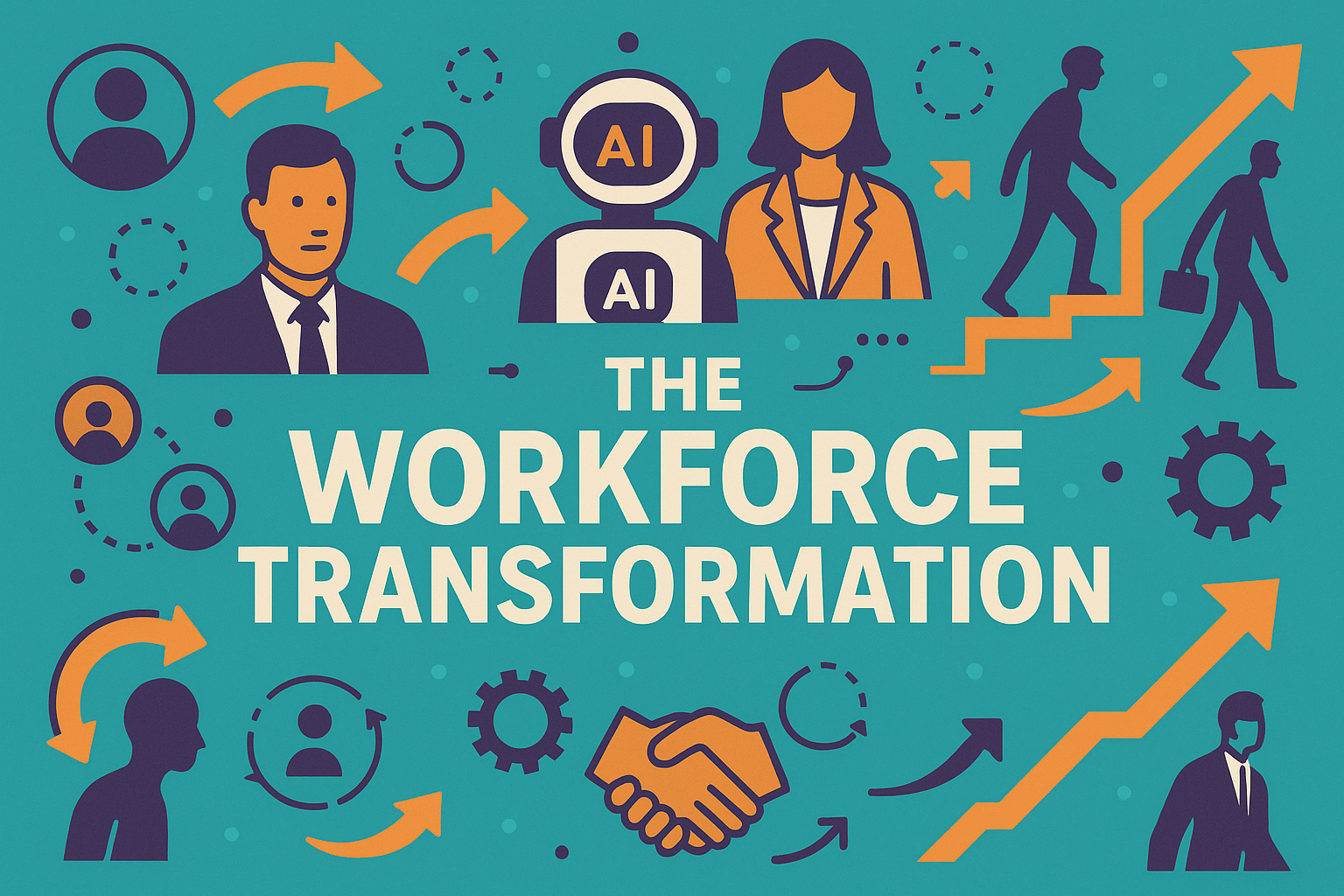← Back to Articles

87% of Leaders Expect AI Agents to Redefine Human Roles Within Two Years
A comprehensive KPMG study released June 30th reveals that 87% of business leaders believe AI agents will fundamentally transform how companies define employee performance, career advancement, and organizational structure within the next two years.
Workforce Evolution:
The research shows 65% of current roles will require new AI collaboration skills, with human-agent teams consistently outperforming solo workers by 40%. Rather than replacing jobs, AI agents are creating new categories of work focused on strategic thinking, creative problem-solving, and complex decision-making that requires human judgment.
Performance Redefinition:
Traditional metrics based on task completion and productivity are shifting toward strategic thinking, innovation, and AI collaboration effectiveness. Companies are developing new performance frameworks that measure how well employees leverage AI agents to achieve business outcomes rather than individual output metrics.
Snowflake Summit Launch:
Snowflake unveiled its Data Science Agent on June 24th, enabling business analysts to perform complex data analysis through natural language queries. The agent can build predictive models, generate insights, and create visualizations without requiring coding skills, democratizing advanced analytics across organizations.
Major Enterprise Deployments:
BNY Mellon deployed 50 financial analysis agents, reducing report generation time by 70% while improving accuracy and enabling analysts to focus on strategic recommendations. JPMorgan Chase launched customer service agents handling 2 million daily inquiries with 95% resolution rates. Unilever implemented HR agents automating 80% of recruitment screening while improving candidate experience.
New Job Categories:
The transformation is creating entirely new roles: Agent Trainers who optimize AI performance, Human-AI Collaboration Specialists who design effective workflows, and Agent Performance Analysts who measure and improve agent effectiveness. These positions require hybrid skills combining domain expertise with AI understanding.
Skills Evolution:
The most valuable employee skills are becoming prompt engineering, agent supervision, strategic decision-making with AI assistance, and the ability to translate business requirements into agent capabilities. Technical skills are less important than understanding how to effectively collaborate with AI systems.
Employee Satisfaction:
Companies investing in workforce transformation report 25% higher employee satisfaction as workers focus on meaningful, strategic work rather than routine tasks. The key is positioning AI agents as productivity enhancers rather than job threats.
Implementation Strategies:
Successful organizations are investing heavily in upskilling programs, creating clear career paths for AI-augmented roles, and establishing governance frameworks for human-agent collaboration. Change management and communication are critical for smooth transitions.
TL;DR:
• 87% of leaders expect AI agents to redefine human roles within two years
• 65% of roles will require new AI collaboration skills
• Snowflake launches Data Science Agent for business analysts
• Major banks deploy agents for financial analysis and customer service
• New job categories emerge: Agent Trainers, Collaboration Specialists, Performance Analysts
• Companies report 25% higher employee satisfaction with AI-augmented work
The Workforce Transformation
agents.one • Jun 30, 2025

A comprehensive KPMG study released June 30th reveals that 87% of business leaders believe AI agents will fundamentally transform how companies define employee performance, career advancement, and organizational structure within the next two years.
Workforce Evolution:
The research shows 65% of current roles will require new AI collaboration skills, with human-agent teams consistently outperforming solo workers by 40%. Rather than replacing jobs, AI agents are creating new categories of work focused on strategic thinking, creative problem-solving, and complex decision-making that requires human judgment.
Performance Redefinition:
Traditional metrics based on task completion and productivity are shifting toward strategic thinking, innovation, and AI collaboration effectiveness. Companies are developing new performance frameworks that measure how well employees leverage AI agents to achieve business outcomes rather than individual output metrics.
Snowflake Summit Launch:
Snowflake unveiled its Data Science Agent on June 24th, enabling business analysts to perform complex data analysis through natural language queries. The agent can build predictive models, generate insights, and create visualizations without requiring coding skills, democratizing advanced analytics across organizations.
Major Enterprise Deployments:
BNY Mellon deployed 50 financial analysis agents, reducing report generation time by 70% while improving accuracy and enabling analysts to focus on strategic recommendations. JPMorgan Chase launched customer service agents handling 2 million daily inquiries with 95% resolution rates. Unilever implemented HR agents automating 80% of recruitment screening while improving candidate experience.
New Job Categories:
The transformation is creating entirely new roles: Agent Trainers who optimize AI performance, Human-AI Collaboration Specialists who design effective workflows, and Agent Performance Analysts who measure and improve agent effectiveness. These positions require hybrid skills combining domain expertise with AI understanding.
Skills Evolution:
The most valuable employee skills are becoming prompt engineering, agent supervision, strategic decision-making with AI assistance, and the ability to translate business requirements into agent capabilities. Technical skills are less important than understanding how to effectively collaborate with AI systems.
Employee Satisfaction:
Companies investing in workforce transformation report 25% higher employee satisfaction as workers focus on meaningful, strategic work rather than routine tasks. The key is positioning AI agents as productivity enhancers rather than job threats.
Implementation Strategies:
Successful organizations are investing heavily in upskilling programs, creating clear career paths for AI-augmented roles, and establishing governance frameworks for human-agent collaboration. Change management and communication are critical for smooth transitions.
TL;DR:
• 87% of leaders expect AI agents to redefine human roles within two years
• 65% of roles will require new AI collaboration skills
• Snowflake launches Data Science Agent for business analysts
• Major banks deploy agents for financial analysis and customer service
• New job categories emerge: Agent Trainers, Collaboration Specialists, Performance Analysts
• Companies report 25% higher employee satisfaction with AI-augmented work